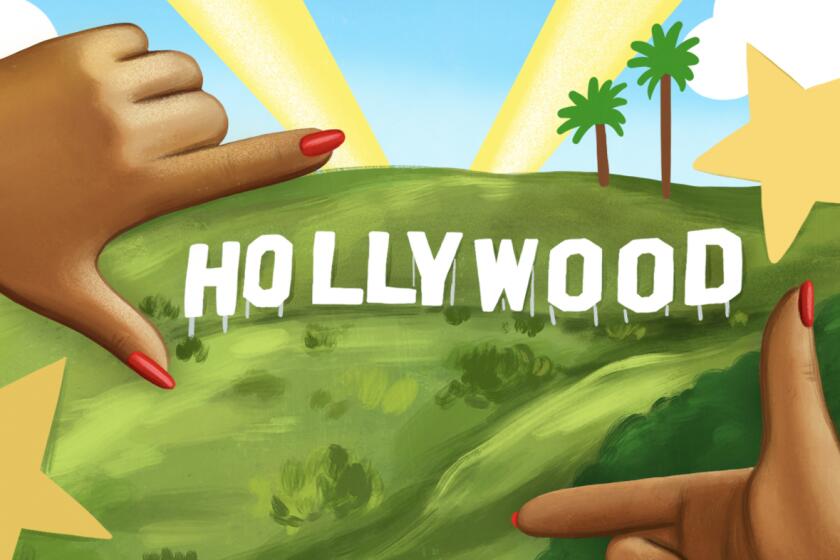Explaining Hollywood: How to find a talent agent who’s right for you

- Share via
When Fatima Reedy was 19, she moved to Los Angeles from Utah to act. She had no connections and no representation — just a dream. After about a year of auditioning, she was approached by two agents, who were white.
“They basically told me they would only sign me if I permanently flat-ironed my hair and if I pretty much conformed to, in my eyes, ... their white clients,” she said. “I was like, ‘I’m Black, I can’t get rid of my hair, can’t get rid of my curves, can’t get rid of my curls.’”
She didn’t want to keep auditioning for the trope of sassy Black friend and became frustrated that they didn’t send her out for leading roles. Later, she realized she was the only person of color on their roster.
“Instead of seeing me, they wanted to change me,” Reedy said.
When they parted ways, she worried her career was over. But looking back, Reedy said she wanted representation so badly that she hadn’t considered the agents’ race, previous clientele, or ultimately, whether they were a good fit for her.
Actors and many other performers will reach a stage in their careers when they need representation from an agent, a manager, a lawyer or other professionals. Choosing the right representation is important — and so is choosing when to bring on representation. To help you navigate these questions, we talked to Reedy, as well as Jaia Thomas, an attorney who founded Diverse Representation, and WME talent agent Yasmine Pearl — who has represented artists including Marsai Martin, Rita Ora and Zayn Malik in her 14-year career.
Wait, what is an agent? What is a manager?
A manager oversees the day-to-day operations of your career, while agents help find and secure opportunities, bookings and auditions.
When am I ready for an agent?
Thomas said you don’t need an agent right away.
“A lot of people think that … they need representation like right now,” Thomas said. “And the truth of the matter is that not everyone is necessarily ready for representation.”
Reedy said that when she first began searching for an agent, she was rejected — a lot.
“I spent months researching and creating a list of representation when I first moved here, and I probably sent over 200 emails out,” she said. “I called every agency and … I was met with, every single time, ‘We don’t take calls unless you’re referred.’ I maybe got five replies out of my 200 emails that I sent.”
What makes someone ready for representation is when there’s traction in their careers.
“I think that’s an important question that talent needs to think about,” Thomas said. “Am I ready for representation? Do I have the projects? Do I have the momentum? There’s a lot that can be done without” an agent.
Thomas also explained that down the line, you might consider an attorney for dealing with contracts, providing red lines, giving feedback and dealing with intellectual property on scripts. Most people also don’t need publicists until they’re more established, she said.
The entertainment industry has been plagued by scams targeting acting hopefuls, parents of child actors and others. Here’s what to look out for and what to do.
What should I look for in an agent?
The school that an agent graduated from is unimportant, Thomas said. Rather, it’s their expertise and history that is paramount.
“First and foremost, it’s important to understand the type of client an agent represents,” Thomas said. “Do your due diligence to just look at their roster of current clients to make sure that ... you fall in that lane or that there’s some kind of synergies there.”
Reedy said that in retrospect, she wishes she asked her former agents how many Black clients they represented and inquired about the type of roles they envisioned for her.
Thomas said that an asset Black agents, attorneys and professionals have is that they have overcome so many hurdles and can relate even more to Black clients who’ve had to do the same.
“I’ve met Black talent who said, ‘To succeed, I need white reps.’ I’ve had someone tell me that they would rather have a Jewish attorney than have me as their attorney,” Thomas said. “But the good thing is there are clear examples now in Hollywood of very successful Black talent that have Black reps: Lena Waithe and her Black manager, Issa Rae and her predominantly Black team, Marsai Martin and her Black agent and Black publicists.”
Different agents will have different working styles — hands-on, hands-off. So Thomas emphasized setting expectations, discerning if your personalities match well, and openly talking about your goals to see if that agent can help you achieve them.
Pearl said that she thinks of representation as a partnership. As an agent, she wants someone whose work excites her.
“If you understand an artist, you are able to advocate for them on a different level,” she said. “If I was an artist, my question [for an agent] would be: ‘What drives you? What type of artist do you enjoy?’ I enjoy representing diverse individuals, unapologetic voices, and I think that speaks to my character and who I am.”
The first step in your Hollywood career shouldn’t be paying L.A. rent. Here’s how to take your first steps toward a career in the entertainment industry, according to experts.
Where can I find an agent?
Performance unions like SAG-AFTRA will have a list of licensed talent agents, and sites such as Backstage offer resources such as the “Call Sheet,” featuring thousands of top casting directors, talent agents, managers, companies, schools and more.
You’ll want to look at what each agency specializes in, be it commercials or television, and the types of clients various agents work with.
Thomas initially started Diverse Representation — an initiative to increase the exposure and number of African American attorneys, agents, managers and publicists working in the sports and entertainment industry — because although most of her clients are Black, she often found that she was the only Black person on her clients’ team.
When Thomas asked her clients why, they often told her they didn’t know where to find Black representation.
Now, Diverse Representation serves as a free database of Black agents, where aspiring creatives can submit their profiles and attend showcases.
Thomas said some junior agents actively visit these showcases, in addition to other open mic nights and festivals to find fresh faces to add to their rosters.
For many people who pursue entertainment as a career, it takes years to get yourself to where you are making money from your creative work. For making money in the meantime, there’s always waiting tables. But more and more people are turning to platforms like TikTok, Twitch and Patreon.
How do I contact an agent?
Thomas said that it can be challenging to get in touch with representatives at larger agencies, such as ICM or Paradigm, as they are inundated with hundreds of inquiries daily. When you’re just starting, it might be easier to get in touch with reps who own boutique agencies or to submit queries through the smaller agents’ website.
“If there’s a specific agent that you’re interested in, try to find out if you have a mutual connection with that agent ... to help broker that introduction,” she said.
Thomas and Pearl agreed that you need to do something to stand out in your email.
“I want to know talent. This business is driven on talent,” said Pearl. “If someone emailed me and said, ‘Hey, I just finished this amazing short film. I wrote it, I directed it or I starred in it and I feel like it gives me a great element of comedy mixed with a little drama,’ I’m going to click on the short film. ... And if I think this person is amazing, I’ll email them back.”
She said that it’s important for entertainers and creatives to know that representation changes at every level as you grow in your career.
It’s important to continue to do the work as you’re waiting, Thomas said.
“Until you get representation, do the work to get noticed by reps, put your name out there, create content, enter yourself in festivals,” she said.
Send the L.A. Times your questions about breaking into and working in the entertainment industry.
How do I prepare for a meeting with an agent?
Reedy recommends bringing a list of questions to show that you’ve done your research and that you’re serious.
“It is a standard practice to show up with a headshot and resume,” she said. “As far as wardrobe ... I think it’s important that people show up as their own brand and their own style so the agent knows what they’re getting into. I don’t show up in a suit because ... I don’t want to showcase myself on a business front if I’m not vying for business roles.”
Echoing Reedy, Thomas said you should “show up as yourself in a professional way.” And preparedness is key. Bring materials, she said, that show your creative product. Writers should bring a sample of their work, for example; actors should provide a reel and headshot.
“Ask around if you’ve never had a meeting with a rep before. Ask some of your friends who may have, and get their feedback on what worked and didn’t work,” she said.
Rejection and uncertainty are part of working in Hollywood, but joy, creativity and fun can be too. Here’s how to manage your mental health.
Why finding supportive representation is important
In the last few years, Reedy has been hustling, securing roles in commercials and movies, and landing her first Netflix role. She’s now represented by a white agent in Los Angeles who works for Shauntiel Lindsey Talent Agency, which is owned by a Black woman.
Recently, she decided to move out of Los Angeles temporarily to film a movie in Utah and see where else life might take her.
She’s starting to feel hopeful about the state of Black representation in Hollywood — and her next goal is to find a Black manager to add to her team.
Read more of The Times’ guide to working in Hollywood.
More to Read
Inside the business of entertainment
The Wide Shot brings you news, analysis and insights on everything from streaming wars to production — and what it all means for the future.
You may occasionally receive promotional content from the Los Angeles Times.
















